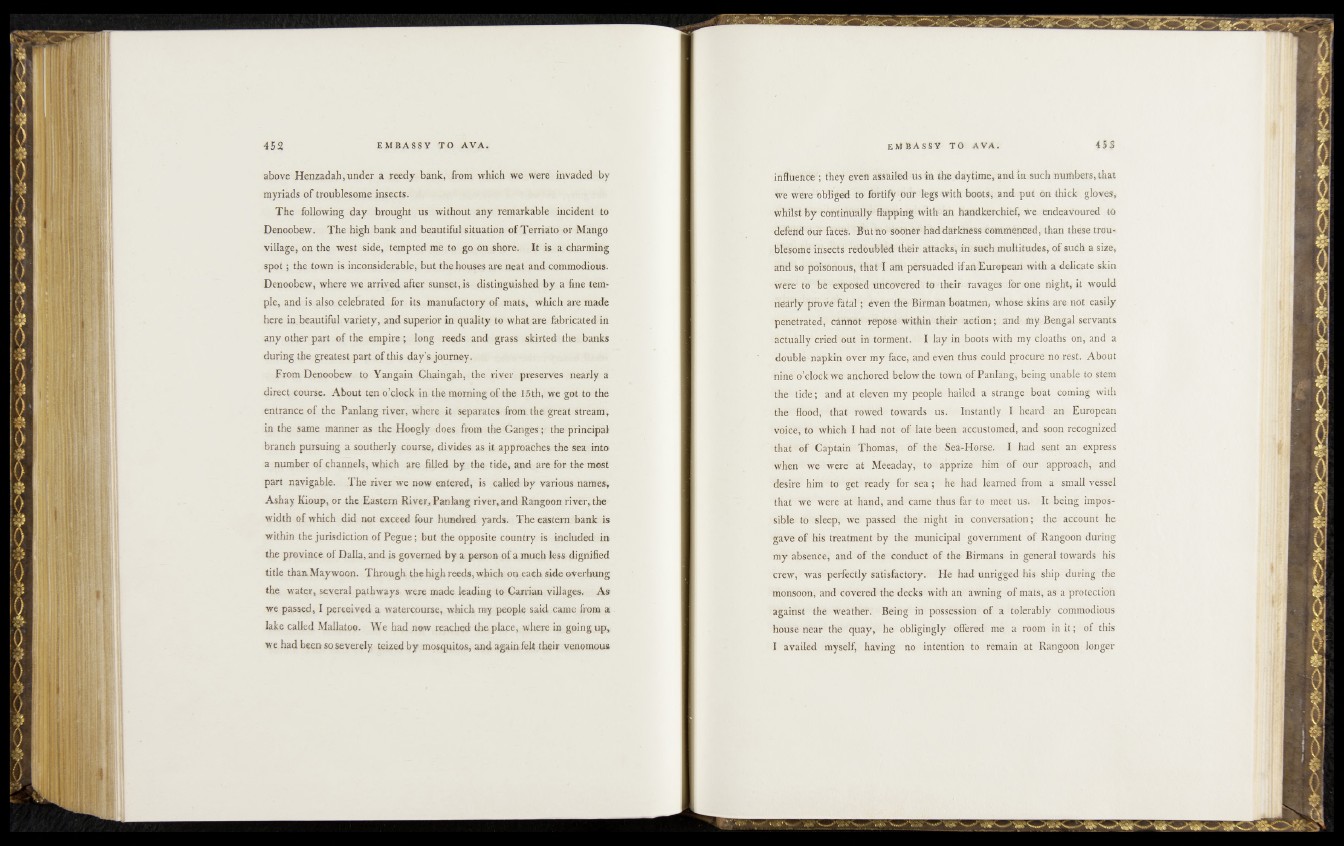
above Henzadah, under a reedy bank, from which we were invaded by
myriads of troublesome insects.
The following day brought us without any remarkable incident to
Denoobew. The high bank and beautiful situation of Terriato or Mango
village, on the west side, tempted me to go on shore. It is a charming
sp o t; the town is inconsiderable, but the houses are neat and commodious.
Denoobew, where we arrived after sunset, is distinguished by a fine temple,
and is also celebrated for its manufactory of mats, which are made
here in. beautiful variety, and superior in quality to what are fabricated in
any other part of the empire; long reeds and grass skirted the banks
during the greatest part of this day’s journey.
From Denoobew to Yangain Ghaingah, the river preserves nearly a
direct course. About ten o’clock in the morning of the is th , we got to the
entrance of the Panlang river, where it separates from.the great stream,
in the same manner as the Hoegly does from the Ganges ; the principal
branch pursuing a southerly course, divides as it approaches the sea into
a number of channels, which are filled by the tide, and are for the most
part navigable. The river we now entered, is called by various names,
Ashay Eioup, or the Eastern River, Panlang river, and Rangoon river, the
width of which did not exceed four hundred yards. The eastern bank is
within the jurisdiction of Pegue; but the opposite country is .included in
the province of Dalla, and is governed by a person of a much less dignified
title than May woon. Through the high reeds, which on each side overhung
the water, several pathways were made leading to Carrion villages, As
we passed, I perceived a watercourse, which my people said, came from at
lake called Mallatoo. We had new reached the place, where in going up,
we bad been so severely teized by mosquitos, and again felt their venomous
iflfltie&cc'; théÿ eÿëii assailed Us 4ft the daytime,and la such numbers, that
We Were obliged to fortify tuif leg* With boots, and put on thick gloves*
whilst by toutinfrilfy I flapping with an handkerchief, We. endeavoured to
defend out faces. But no sotmer had darkness commenced, than these trim*
blesome insects redoubled thëir attacks, in such multitudes, of such a size,
aM sdjfofeôribiiS,' that î SM^pftWttaded^aôfiuMjaatri-srith a delicate skin
were" td ■ be nkposed uncovered to their- ravages for one night, it would
rtéârlÿJfrtt>ve ftdal ; ' eVen the Binti^i bostmeil, whose skins are not easily
penetrated, cànnot reprise Within their aotian;.and my Bengal servants.
Actually cried out in torment. I lay in boots with my cloaths ori,i and a
doüblé-napkin over m y face, and even thus could procure no rest. About
time o’clock we anchored below the town of Panlang,- being unable to stem
the tide-; and at eleven my people hailed a strange boat coming with
the flood,‘'that rowed towards: us. Instantly i. heard au European
voieé; to which I had not of late been accustomed, and soon recognized
that o f ’Captain Thomas, of the Sea-Horsè. 1 had soit an express
when Wë were at Meeaday, to apprize him of our approach, and
desire him to get ready for sea ; h e had learned from a small vessel
that we were at hand, and came thus far to meet us. It being impossible
to sleep, we passed the night in conversation ; the account he
gave of his treatment by the municipal government of Rangoon during
my absence, and of the conduct of the Birmans in general towards his
crew, was perfectly satisfactory. He had unrigged his ship during the
monsoon, and covered the decks with an awning of mats, as a protectioh
against the weather. Being in possession of a tolerably commodious
house near the quay, he obligingly offered me a room in it; of this
I availed myself, having no intention to remain at Rangoon longer